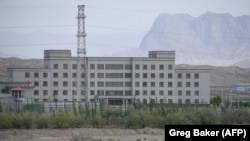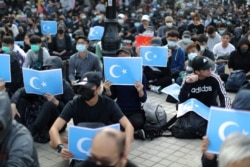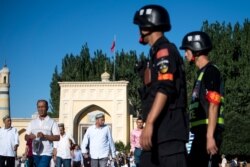On December 10, China’s Embassy in the United States posted several tweets about the state of religious freedom in the northwestern Xinjiang Uighur Autonomous Region.
“In Xinjiang, all citizens enjoy the same rights. It is a completely independent choice of each citizen to believe in, or not believe in, any religion,” the embassy said.
“The efforts in counter-terrorism and deradicalization in Xinjiang have never targeted any specific religion or ethnic group, and devout religious believers are never equated with extremists.”
That is false. Religious freedom is strongly curtailed in Xinjiang, as elsewhere in China. Chinese authorities have sent citizens who expressed their religious faith to so-called “re-education camps.”
The persecution of religious minorities in Xinjiang is well-documented. As Polygraph.info previously reported, leaked government documents and investigations by rights groups and news organizations have produced abundant evidence that China maintains a massive network of detention centers where an estimated 1 million to 3 million people have been locked up.
Uighurs have also been subjected to mass sterilization campaigns. Experts say those campaigns have a strong component of Islamophobia and may amount to genocide. In July, two Uighur activists groups filed a claim with the International Criminal Court (ICC) alleging that Chinese officials had engaged in genocide and crimes against humanity against the Uighurs in Xinjiang. On December 14, the Hague-based court declined to hear the case on jurisdictional grounds, as China is not a signatory to the ICC.
New York-based Human Rights Watch reported on December 9 that a big data program is being used to “arbitrarily” target Muslims in Xinjiang for possible detention. People have been arrested for modest expressions of faith, such as growing a beard or fasting. And Chinese authorities have reportedly forced some Uighurs to drink alcohol and eat pork, which Islam proscribes.
In January, Radio Free Asia (RFA) reported that two Chinese Communist Party (CCP) cadres were arrested for “harboring a fugitive” after failing to confiscate a religious book from a villager during a home visit. The book advised Muslims on what to do when making the hajj, the Islamic pilgrimage to Mecca. The hajj is one of the five pillars of Islam and required of all able-bodied Muslims once in their lifetime.
In October, China reportedly banned private pilgrimages to Mecca. Those wishing to make the hajj must prove they are “patriotic and law-abiding.” The state outfits pilgrims with GPS trackers to make their trips “better and safer,” the CCP-run Global Times newspaper reported.
Religious sites and artifacts in Xinjiang are also being targeted.
Drawing from satellite imagery, an Australian Strategic Policy Institute study released in September estimates that 16,000 mosques, or 65% of the total in Xinjiang, “have been destroyed or damaged as a result of government policies, mostly since 2017.”
In January, RFA reported on the so-called “Sanxin Huodong“ or Three News campaign, in which Uighurs and other Muslims are pushed to abandon traditional home decor with more Sinicized furnishings. That campaign followed a 4 billion yuan ($575 million) effort to “modernize” the region, partially destroying elements of traditional Uighur design.
Members of other religious groups in the region reportedly have also faced internment and torture.
In China, religious persecution extends well beyond Xinjiang. For years, Pew Research has placed China among countries that maintain “very high” state restrictions on religious freedoms.
China officially recognizes five religions — Buddhism, Taoism, Islam, Catholicism, and Protestantism. As Pew noted, only people who have registered with a “patriotic religious association” are allowed to register with the government and conduct worship services.
John Powers, a research professor at the Alfred Deakin Institute at Deakin University, Australia, said China’s constitution permits only “the practice of ‘normal religious activities’, narrowly defined as practices undertaken at times and places approved by the state that support the government and its policies.”
Other religious and spiritual groups are banned.
Article 300 of the Criminal Law of the People’s Republic of China broadly prohibits "superstitious sects, secret societies, and evil religious organizations.” Violators face up to life in prison.
A 2019 U.S. State Department report noted there is “no published criteria for determining, or procedures for challenging, such designations.”
According to that report, banned groups include the Falun Gong movement, the Guanyin Method religious group (Guanyin Famen or the Way of the Goddess of Mercy), and Zhong Gong (a qigong exercise discipline).
Other Christian groups are considered “evil cults.” These include the Shouters, The Church of Almighty God (Eastern Lightning), Society of Disciples (Mentu Hui), Full Scope Church (Quan Fanwei Jiaohui), Spirit Sect, New Testament Church, Three Grades of Servants (San Ban Puren), Association of Disciples, Lord God religious group, Established King Church, the Family Federation for World Peace and Unification (Unification Church), Family of Love, and South China Church.
Recognized and unrecognized religious groups alike are subject to surveillance. Bitter Winter, a Turin-based online magazine devoted to religious issues in China, reported that more than 200 security cameras were installed in churches and temples in one southeastern Chinese county. The installation of cameras under the pretense of security and anti-terror purposes at churches and temples has also been documented by Reuters and others.
Authorities have also regularly carried out cross demolition campaigns, shuttered unauthorized churches and jailed pastors. China has also recently begun prosecuting businessmen for selling audio versions of the Bible.
Those who continue to practice their faith in defiance of state restrictions have been subjected to harassment, arrest, detention, torture, imprisonment and forced indoctrination, the State Department reported.







